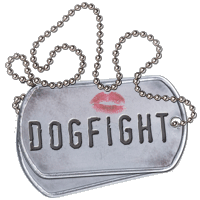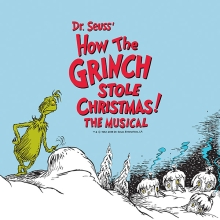Filichia Features: Dogfight Wins
Filichia Features: Dogfight Wins
 Here’s a story about “The Three B’s” that has nothing to do with Bach, Beethoven and Brahms.
Here’s a story about “The Three B’s” that has nothing to do with Bach, Beethoven and Brahms.
Instead, this trio of young men can be called The Three Little Pigs who deserve three “F’s” for their behavior.
But three writers – librettist Peter Duchan and songsmiths Benj Pasek and Justin Paul -- get three "A’s" for effectively dramatizing Messrs. Bernstein, Boland and Birdlace, who bond and nickname themselves “The Three B’s” in Dogfight.
Because these three guys and virtually everyone else are in their twenties, Dogfight is an ideal college show. This was again proved by Cole Edick’s recent (and excellent) production for the Harvard-Radcliffe Dramatic Club in Cambridge, Massachusetts.
Truth to tell, the sizable amount of profane language may well preclude some high schools from embracing Dogfight. Because colleges are a different story, they’re more logical locales for this story.
The 2012 musical shows us that these three Marines are out to have a great time before they ship out to Vietnam. It is, by the way, Nov. 21, 1963, the last day before America lost a profound amount of its innocence; the assassination of President John F. Kennedy occurred the following day.
These lads already aren’t so innocent. They and their equally heinous buddies will engage in a dogfight – a euphemism for a disgusting prank in which each Marine goes out specifically in search of the least attractive young woman he can find. He then brings her to a dance where his fellow Marines vote on the ugliest woman. The winner gets a cash prize, while the “Dog” gets humiliated.
“Marines have been holding dogfights since they wrote the Constitution," says one of the Bees, acting as if such a tradition has been validated by time. No, that doesn’t make a dogfight right. And yet, give Pasek and Paul credit for writing well for their characters who sing "The game ain't over till the fat lady barks."
We center Eddie Birdlace -- the only “B,” in fact, who gets a first name, for he’s our leading man. While he’s at a diner, he sees Rose, the overweight twentysomething waitress who hasn’t found much love from boys or men.
Rose can’t believe that any young man could like the likes of her. "A lonely, pathetic, ugly fat girl” is how she sees herself. So Eddie works hard to have her join him. Finally she feels he’s sincere, which makes the impending tragedy that much greater. In song, Rose proclaims that Eddie is "Nothing Short of Wonderful" while we know he's nothing of the kind and substantially short of decent. The sad irony is that she's afraid that she won't measure up to him.
Thankfully, the moment that they reach the dance, Eddie has second thoughts and says they shouldn't go in. Cole Edick directed Eddie's buddy to interrupt him much too quickly. We need time for that to sink in so we can see that Eddie really does have a heart and realizes the consequences of the game.
Sad to say, Eddie’s second thoughts are too late. Now that he doesn’t want to take Rose inside, she thinks he is ashamed of her, so he must bring her in. When she discovers the truth, she is of course devastated.
But the event does eventually make Rose find her self-esteem. "You're the ugly one, not me," she snarls at him. The truth has set her free.
Eddie wants to make it up to her. Derek Speedy, playing the character, had a fine moment when Rose asked if his now asking her to dinner was still part of the dogfight. He immediately laughed and said "No" -- but only a second later he turned serious. Eddie knew that his heinous actions had lost him the right to add any levity to the conversation. He seemed earnest in spending most of the rest of the show trying to make it up to her.
Most, but not all. Peer pressure is hard, especially for a Marine who can’t appear to be, shall-we-say, “whipped” by a woman. (Translation: Liking her, being nice to her, appreciating her and loving her.) So Eddie errs again and much time must pass before he finds the courage to be a good guy and love a fine woman.
(If the Marines do an annual musical, chances are Dogfight is not one they’ll choose.)
Because the show is set in the early ‘60s, Dogfight acknowledges the atomic bomb. Now, almost 70 years after the first one was dropped in Hiroshima, the threat of nuclear war isn't first and foremost in our thoughts. (Alas, other fears have supplanted it.) But back then, fewer than two decades after Nagasaki, the notion that the world might not be long for this world was on everyone's mind. That gave people license and permission to do wild things on the (so-far faulty) premise that there might be no tomorrow when one would have to pay for his sins. It’s part of what motivates The Three B’s.
But there’s that other serious ‘60s threat: The Vietnam War. Before The Three B’s ship out, they blithely claim they’ll be "forever young." We know they won't, of course, and not merely because people automatically age; the experiences they will have in Vietnam will either age them very fast or kill them.
And yet, Eddie fully believes that he'll be fine in Vietnam because "I've got 13 weeks of training under my belt." He also brags that "Shooting clears things up very quickly." That's true, but he's naive to assume that he'll be the only one doing the shooting. That he might be on the receiving end doesn't occur to him.
Dogfight also offers plenty of dramatic irony (meaning we know something that the characters don’t). Act Two begins with the guys singing that when their tour of duty is done, they’ll receive a “Hometown Hero’s Ticker Tape Parade.” But when Eddie comes marching home again (as the only surviving B), there are no hurrahs. His prediction was literally worth spit -- as a female flower child expectorates right in his face for fighting in this war that she deems unjust.
John Waters, who wrote and directed the film of Hairspray, has often said that what greatly thrilled him about the stage show is that future productions would allow a heavy-set girl to play a lead and not just a chorus role. That’s also true of Dogfight. In fact, none of your performers need be conventionally attractive, let alone beautiful or handsome. If your young men are, you should pardon the expression, dogs, the show gains an irony. Ugly guys are often all too willing to overlook their own deficiencies while being hypercritical if a girl's second toe is longer than her big one.
However, if all you do have on hand are dazzlingly pretty women, remember that they can be made to look ugly. Passion taught us that when the beautiful Donna Murphy morphed into the hideous Fosca.
Rose, however, should have a lovely voice to indicate her inner beauty. She should also be able to play the guitar in at least rudimentary fashion, for the character is an amateur folksinger to boot.
Although a scene at a dance is central to the story, Dogfight is not a dance-heavy show. None of your performers need be good dancers; in fact, you might get a smile or two out of your audience if the young women clomp around awkwardly and the young men do even worse.
You’ll need uniforms for both your Marines and your waitresses. For the latter, get those sexless waitress dresses made from fabric so cheap and thin that it's almost translucent. And who at Harvard gets the credit for the great detail when Rose got all dressed up for her big date – and inadvertently had a bra strap casually showing? Was it Taylor Kay Phillips, the marvelous actress who played Rose, male costume designer Andrew Gelfand or female costume designer Tess Davison?
If there are parents who still prefer that their sons have short hair, Dogfight will make them happy even before the show starts performances. After all, short military haircuts are a must.
One thing wasn’t quite clear in Edick’s production. Marcy, one of the young women brought to the dogfight, expects to win because her front teeth are missing. She shows this affliction to Rose by popping out her false front teeth. The way Edick staged it, we couldn’t see what the problem was.
Because you can’t count on having a girl with genuine false front teeth, you must find a way to blacken her actual teeth and then find a device that can be snapped on in front of them.
If all else fails, contact the fathers of Alan (Little Shop of Horrors) Menken or Matthew (Elf) Sklar. Both are dentists, and are undoubtedly sympathetic to the needs of musicals.
 You may e-mail Peter at pfilichia@aol.com. Check out his weekly column each Tuesday at www.masterworksbroadway.com and each Friday at www.kritzerland.com. His new book, Strippers, Showgirls, and Sharks – a Very Opinionated History of the Broadway Musicals That Did Not Win the Tony Award is now available at www.amazon.com.
You may e-mail Peter at pfilichia@aol.com. Check out his weekly column each Tuesday at www.masterworksbroadway.com and each Friday at www.kritzerland.com. His new book, Strippers, Showgirls, and Sharks – a Very Opinionated History of the Broadway Musicals That Did Not Win the Tony Award is now available at www.amazon.com.

























